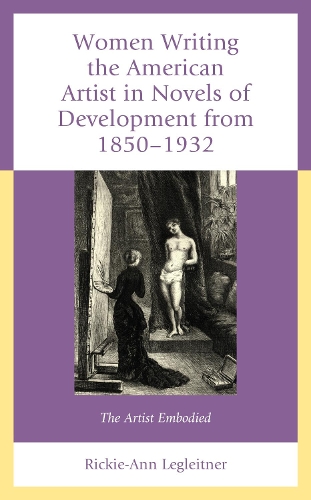
Women Writing the American Artist in Novels of Development from 1850-1932: The Artist Embodied
(Hardback)
Publishing Details
Women Writing the American Artist in Novels of Development from 1850-1932: The Artist Embodied
By (Author) Rickie-Ann Legleitner
Bloomsbury Publishing PLC
Lexington Books
6th May 2021
United States
Classifications
Professional and Scholarly
Non Fiction
Literary studies: c 1900 to c 2000
813.409357
Physical Properties
Hardback
244
Width 163mm, Height 228mm, Spine 25mm
544g
Description
From 1850-1932, American women artists found their bodies and desires narrowly defined by cultural, social, and legal patriarchal systems. Women were typically depicted as abnormal for harboring desires that lay outside of motherhood, yet female coming-of-age stories complicate this rhetoric by revealing how the roles of wife and mother are themselves abnormal in their self-sacrificial demands. The Artist Embodied: The Development of Women Artists in American Literature from 1850-1940 contends that in the female Knstlerromane, or artist novels, the protagonists body demands an outlet to articulate desires that defy restricting patriarchal rhetoric. This demand becomes an artistic drive to express an embodied knowledge in a new language of artistic invention that establishes the female body as generative beyond corporeal reproduction.This book explores the development of the female artist in American literature by women writers, including the work of E.D.E.N Southworth, Elizabeth Stuart Phelps, Kate Chopin, Willa Cather, Jessie Fauset, and Zelda Fitzgerald. Each of these authors depicts the coming-of-age of women artists to assert the legitimacy of their art, pushing back against the erroneous notion that women are, at best, talented hobbyists, and, at worst, a scribbling mob drawing attention away from more substantial works by critically acclaimed male authors.
Reviews
In Women Writing the American Artist in Novels of Development from 1850-1932: The Artist Embodied, Rickie-Ann Legleitner makes a substantial contribution to the scholarship on the female artist novel of development through compelling analyses of patriarchal Americas resistance to recognizing women artists as creators of high art. In five Knstleromane published between 1850 and 1932, Legleitner focuses on how her selected women writers reconfigure accepted domestic and sentimental themes into declarations of female individualism and autonomy that establish the female bodys generative capabilities not only for corporeal reproduction but for liberating cultural production. Complicating the analyses through tropes of race, ethnicity, class and ability, the study examines the female fictional artists negotiating private and public spaces, the home and the marketplace, much as the women writers who created them did.
-- Rita Bode, Professor of English Literature, Trent UniversityAuthor Bio
Rickie-Ann Legleitner is assistant professor of English and director of womens, gender, and sexuality studies at the University of Wisconsin, Stout.
